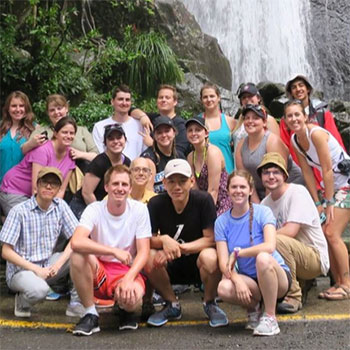We use cookies on this site to enhance your experience.
By selecting “Accept” and continuing to use this website, you consent to the use of cookies.

In recent years a growing number of Laurier History students have had many diverse opportunities to enhance their study of the past through experiential learning in travel courses.
For well over a decade, hundreds of History students and alumni have gone to France and Belgium on War and Memory Battlefield Tours hosted by the Laurier Centre for Military Strategic and Disarmament Studies (LCMSDS), led by Professor Terry Copp (retired), Professor Roger Sarty, and Associate Professor Mark Humphries, as well as affiliated faculty from the University of Waterloo, the Royal Military College, and elsewhere.
We have also offered a number of summer travel courses for credit. For example, in 2011 Professor Len Friesen took 15 students in his senior seminar (HI411) to Russia, in 2014 Associate Professor Blaine Chiasson led 10 students in his third-year course (HI399) to China and Taiwan, and in 2016 Associate Professor Gavin Brockett took 12 students to Israel/Palestine as part of a second-year course.
In both 2017 and 2019 Associate Professor Eva Plach took students to Poland as part of HI288/HI388: “Into that Darkness: Poland, WWII and the Holocaust.” Ten Laurier students joined ten students and a professor from Nipissing University in North Bay, and together they visited various sites related to the genocide of Europe Jews; these included the Auschwitz-Birkenau Memorial and Museum, the Oskar Schindler Factory Museum in Krakow, and the museum at what had been a killing centre at Treblinka. Read about the 2017 Poland course here and get a student's perspective on this experience.
The Poland field course will run again in May of 2022, but this time as part of a Residence Learning Community (RLC). RLCs are themed residence learning communities in which first-year students who share a common interest and common coursework live and learn together in residence. For 2021-22 the partnered course for the History RLC will be HI109, Age of Extremes: Europe's 20th Century. Students who sign up for this RLC will live together in a common dormitory, and during the academic year they will participate in various academic and social events; they will also take HI109 in the fall semester. In May of 2022 interested students will continue on in HI288, which will include two weeks in Poland.
The History Department has long been running RLCs. Our first RLC, Vimy Hall, ran in 2014/15 and included a travel course to France and Belgium led by Dr. Mark Humphries. Our "Pirates Hall" RLC -- on the fascinating history of piracy and the slave economy during the Spanish Empire period -- has been offered two times by Dr. Jeff Grischow; it includes a field course to Puerto Rico. In 2017/18 History and Ancient Studies teamed up with the Medieval and Medievalism Studies program to host an RLC entitled “Camelot Hall” on Ancient Roman Britannia and Early Anglo-Saxon and Viking England. The common course for the RLC students was HI121: “Ancient History in a Global Context,” taught by Alicia McKenzie. The students visited Roman sites like Bath and Hadrian’s Wall, and also toured Anglo-Saxon sites such as Sutton Hoo, as well as the British Museum in London and several regional museums too. In 2018-2019, Dr. Darryl Dee offered an RLC based on HI123 Great Battles in History. In July 2019, Dr. Dee took twenty-three first- and upper-year students on a tour of historical sites in France and Belgium, including Vimy Ridge, Waterloo, Dieppe, the beaches and battlefields of Normandy, and Paris. The students documented their experiences on Instagram (@wlufrance20109).
There have also been other kinds of student travel opportunities available in Canada and the US. For example, in 2016 Professor David Monod took a number of students from his third-year course on American cultural history to NYC. The students worked as Monod's research assistants at the New York Public Library. The results of this research were published in 2020 in a book called Vaudeville and the Making of Modern Enterntainment, 1890-1925. To read more about this opportunity, click here.